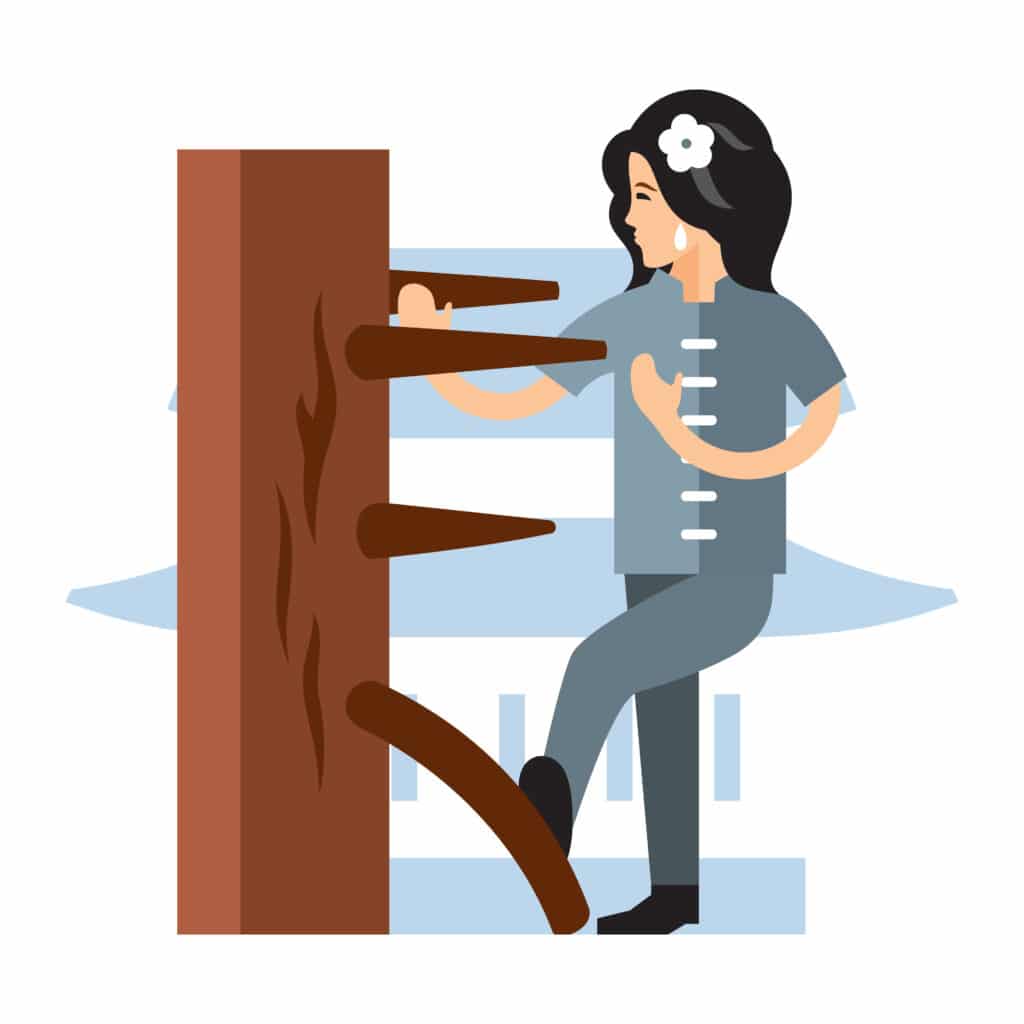If you haven’t guessed yet one of our favorite martial arts to practice is Wing Chun. During one of our kung fu Q&A webinar sessions we where asked:
Why do Wing Chun practitioners chase their opponents hands?
In this video is the answer Sifu Phu Ngo gave to that question.
After listening to Sifu Phu’s answer I totally agree. It’s been my experience playing Chis Sao that many inexperienced students chase hands. I think some of the reason for this is bad muscle memory.
What I mean by this is during our lifetimes we create bad habits. It takes time to develop the ability to place your hands where they belong when they belong there.
The problem arises when you are feeling pressured. This is when the majority of mistakes happen. This is why I am against sparring full out until you have developed a decent level of skill.
I know some of you are thinking:
You have to spar against resisting opponents to get better!

Creating Bad Wing Chun Habits
While I agree you do need to spar, but not at the expense of creating bad habits, which is what happens when you start sparring right away.
You will also develop bad habits if your training partner is in it to win it for themselves.
What I mean by this: Is if your training partner isn’t allowing you to learn how to counter his/her attacks they aren’t giving you the time you need to figure out what your body should be doing. Instead they are inadvertently training you to create mistakes that will eventually become your habit.
I should warn you that it takes a lot of repetitive actions to cover up a bad habit in martial arts. So I am of the opinion that it’s better to just not create the bad habit in the first place.
Another thing most of us do is flinch. While flinching is a natural response to certain types of stimulus it can create a bad habit.
For example: When someone fakes a hook punch you might find that your eyes start to shudder real fast and you turn your head.
Flinching is something we can reprogram our response for. Instead of say fluttering your eyes we can instead train ourselves to throw a strike towards our opponent instead. This would be an example of taking a bad habit and turning it into a good habit.

Using A Wing Chun Wooden Dummy To Correct Chasing Hands
I believe that the Muk Jong is one of the most mis understood training tools in Wing Chun. It’s not only good for training your techniques, and conditioning your bones to take impacts.
The wooden dummy is also good for training proper arm placement. If you spend a good amount of time training on the Muk Yan Jong you will by default train your limbs to go to the right spot at the right time.
Over reaching and shooting past your structure is a common problem that occurs when sparring as well as fighting. Some of it has to do with not being able to deal with your adrenaline properly and some of it has to do with having a bad habit. The good news is both can be cured!
Have you found yourself in a situation before where you where chasing hands?

Thank you Larry, As always, good stuff!
Dan
Thanks for reading Dan! 🙂
Well as this is something Sifu Ngo says a lot in his videos, how can we solve this problem? Because I have the feeling this is the case with most martial arts. They teach proper form and technique but when its time to handle within a fight or sparring session, it often seems that for example other martial arts like boxing win from Wing Chun because of this. So please Sifu, how can we solve the overcommitting of Wing Chun in modern days?
The problem most likely…
The biggest problem is not having training partners who are working with you to overcome it. Because what happens is until you acquire a decent level of skill you end up chasing hands because the pressure coming against you is greater than you can handle.
It’s like deciding to get behind of a wheel of sports car and going 140 mph when you never went past 90 mph. The fact that you never went that fast could cause your body to lock up and you would end up white knuckling the steering wheel. And if there are other cars on the road and curves in the road you might find yourself getting into an accident.
So for starters don’t train with someone who isn’t willing to play you at a speed you can handle.
The next part or I should say in conjunction with, you need to have good techniques and proper structure. While you are learning techniques if you aren’t self correcting or being corrected when you do things like chase a punch for example you are going to create a habit of chasing hands..
The thing is most people who struggle with this already created the habit of chasing hands, so really the best course of action is to slow down while you spar or play chi sao etc… and correct yourself along the way.
It basically comes down to overriding the bad commands in your brain with good commands. The more stubborn the habit the more often you are going to have to over ride the command.
This means for example if you been chasing hands for 10 years, it’s going to be a hot minute before you break yourself of that habit. The good news you can break yourself of that habit through consistent training effort.
With boxers anticipation of their attacks could cause you to chase after their hands. When dealing with other styles (not that styles matter unless you believe in confining yourself to a box). I digress though 🙂
When dealing with any other style, your job is to play your position, don’t chase them. For us sensitivity is everything and Wing Chun is a close quarter fighting system. So instead of dancing around and throwing jabs, I move right in and connect with them and let the energy dictate what my next actions will be. I don’t like to assume anything, so I find it’s better to let things unfold and adapt as they are unfolding…
In my early years of training I dealt with similar situations you are talking about. I struggled with it for awhile because I was guilty of chasing hands..
I broke the habit by understanding how our martial art worked as well as having training partners that didn’t just hammer on me and allowed me to correct my mistakes. What I love so much about the way Sifu Phu teaches is as he is teaching he tells you what the common mistakes are and how you can fix them. I hoped that helped.